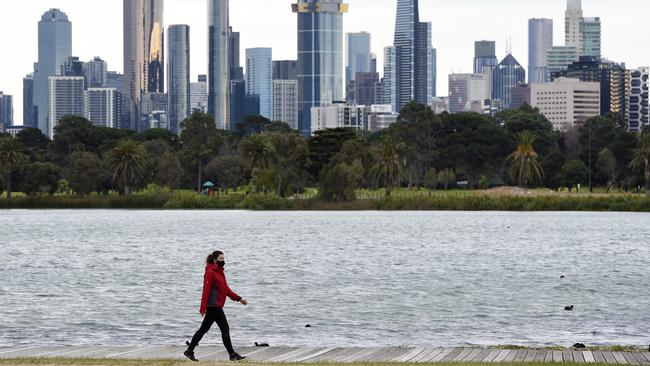More downsides to hard lockdown than benefits

Despite their popularity, there appears to be growing scepticism about the benefits of lockdowns and their significant costs. These include devastating educational impacts, widespread mental health issues, increased domestic violence, loss of basic freedoms and damaged relationships.
Lockdowns were not in the playbook before China locked down Wuhan and the world followed suit. We predict wide, hard lockdowns soon will become a thing of the past in Western nations. Many countries, even liberal democracies such as Denmark and Germany, have accepted this even in the face of the rising Delta infections and deaths in the unvaccinated. With about 1000 daily infections (about the same as NSW), Denmark last week removed all remaining Covid-19 restrictions. While most of the world has come to its senses, Australia and New Zealand are not quite there yet.
For future pandemics, it is likely harsh lockdowns will tend to be used only by authoritarian regimes partly because they can and partly because it strengthens their control over the population.
Although it appears common sense that lockdowns reduce the reproduction rate of a virus, the data is not clear. (Witness Melbourne’s current hard and early lockdown having a higher growth rate than Sydney’s slower and softer one.) But of more concern, the cost of locking down 90 per cent of the population to possibly save some lives has enormous second-order effects.
The mental health impacts have been well documented, with secret Victorian data indicating that emergency self-harm and suicidal presentations are more than double pre-Covid levels. Elective and non-elective surgeries have been delayed, leading to likely excess mortality. What’s spoken of less is the dramatic restrictions on basic human rights.
Freedom of action has been destroyed, regardless of the foolishness of recent protests. Seeing Australian police deploy pepper spray and fire pepper ball rounds against protesters is chilling. Freedom of movement has been almost completely removed, with the Constitution largely disregarded by populist premiers. Our regular intake of 18,000 refugees has been quietly destroyed and tourist destinations in the developing world have suffered terrible economic and job losses.
All this is to say nothing of the widespread job and economic losses in Australia, with many thousands of bankrupt or zombie businesses likely to face a near-certain death.
Lockdowns as an idea originated in the veterinary and livestock industry, which used strict interventions to curb outbreaks such as foot-and-mouth disease in Britain in 2001. Strategies used by the livestock sector are far stricter than even the harshest regime would adopt for humans. Infected herds are shot, burned and buried, even if only a single animal is ill. Ungulates, farmed and wild, that come into contact on a farm earn the same fate. Even humans who come into contact face far more severe restrictions in movement than our harshest lockdowns.
This is why human lockdowns don’t appear to be overly effective – in Western countries they are simply not strict or harsh enough.
Sweden’s chief epidemiologist, infectious diseases expert Anders Tegnell, realised this quickly, imposing traditional interventions such as limiting large gatherings and introducing home-based learning for university rather than school students. Sweden has recorded 1440 deaths per million people, fewer than heavily locked down Argentina (2443 per million), Belgium (2178), Italy (2140), Poland (1993), the UK (1940) and Spain (1799). In fact, Sweden is in 32nd place for relative fatalities.
The difficulty faced by democratically elected leaders is that humans don’t like to face such severe restrictions, so leaders need to make a lot of exceptions. Even the most severe Western lockdowns allow people to go to the supermarket, take their dog to the vet, go to the doctor and visit a chemist.
It’s not just customers, though; people need to work in essential places, which is where most transmission occurs.
The obvious alternative to hard lockdown is an effective vaccine, which we fortunately have. But even without the panacea of 100 per cent vaccination, social distancing, hygiene, effective contact tracing and isolation, and rapid self-testing and protection of the vulnerable work to suppress excessive fatalities.
We will not be able to eliminate this virus for years. So there needs to be a focus on vaccinating all those vulnerable or elderly people who want to be protected. If these people are fully vaccinated then the risk of death from Covid-19 is low. However, we know some Covid deaths are inevitable.
The last question we should ask ourselves is what value do we place on our personal freedom.
This is a quote from the Australian Human Rights Commission: “Human rights are based on principles of dignity, equality and mutual respect, which are shared across cultures, religions and philosophies. They are about being treated fairly, treating others fairly and having the ability to make genuine choices in our daily lives.”
We need to ask ourselves: when do our basic human rights become secondary to a viral pandemic? In the end, Australians wanting their basic rights back will be one of the main factors in ending hard lockdowns.
Graham Turner is managing director of Flight Centre Travel Group. Adam Schwab is chief executive of Luxury Escapes.



Since last year, almost every country – democracies and authoritarian regimes – has used aggressive non-pharmaceutical interventions, specifically lockdowns, as their weapon of choice against the Covid-19 virus.